Maine Coon - Breed Facts & Characteristics
Bigger than your average cat, Maine Coons are one of the largest breeds of domestic cats around. They develop slowly, taking longer than most other breeds. Maybe that explains the Maine Coon’s impressive size. And impressive personality. Smart, sweet and gentle, the Maine Coon bucks cat clichés: They are friendly and coexist well with humans and other pets.
Official name: Maine Coon
Other names: Maine Shag, Shag Cat
Origins: United States
Hair length
3 out of 5Shedding Level
4 out of 5Grooming needs
3 out of 5Energy level*
4 out of 5Vocal
5 out of 5Family pet?*
5 out of 5Compatibility
4 out of 5Can stay alone
2 out of 5Environment (indoor/outdoor)
3 out of 5
| Male | Female |
|---|---|
| Height | Height |
| 25 - 41 cm | 25 - 35 cm |
| Weight | Weight |
| 6 - 10 kg | 4 - 7 kg |
| Life stages | |
|---|---|
| Kitten | Adult |
| 4 to 15 months | 15 months to 7 years |
| Senior | |
| From 7 years | |
Hair length
3 out of 5Shedding Level
4 out of 5Grooming needs
3 out of 5Energy level*
4 out of 5Vocal
5 out of 5Family pet?*
5 out of 5Compatibility
4 out of 5Can stay alone
2 out of 5Environment (indoor/outdoor)
3 out of 5
| Male | Female |
|---|---|
| Height | Height |
| 25 - 41 cm | 25 - 35 cm |
| Weight | Weight |
| 6 - 10 kg | 4 - 7 kg |
| Life stages | |
|---|---|
| Kitten | Adult |
| 4 to 15 months | 15 months to 7 years |
| Senior | |
| From 7 years | |
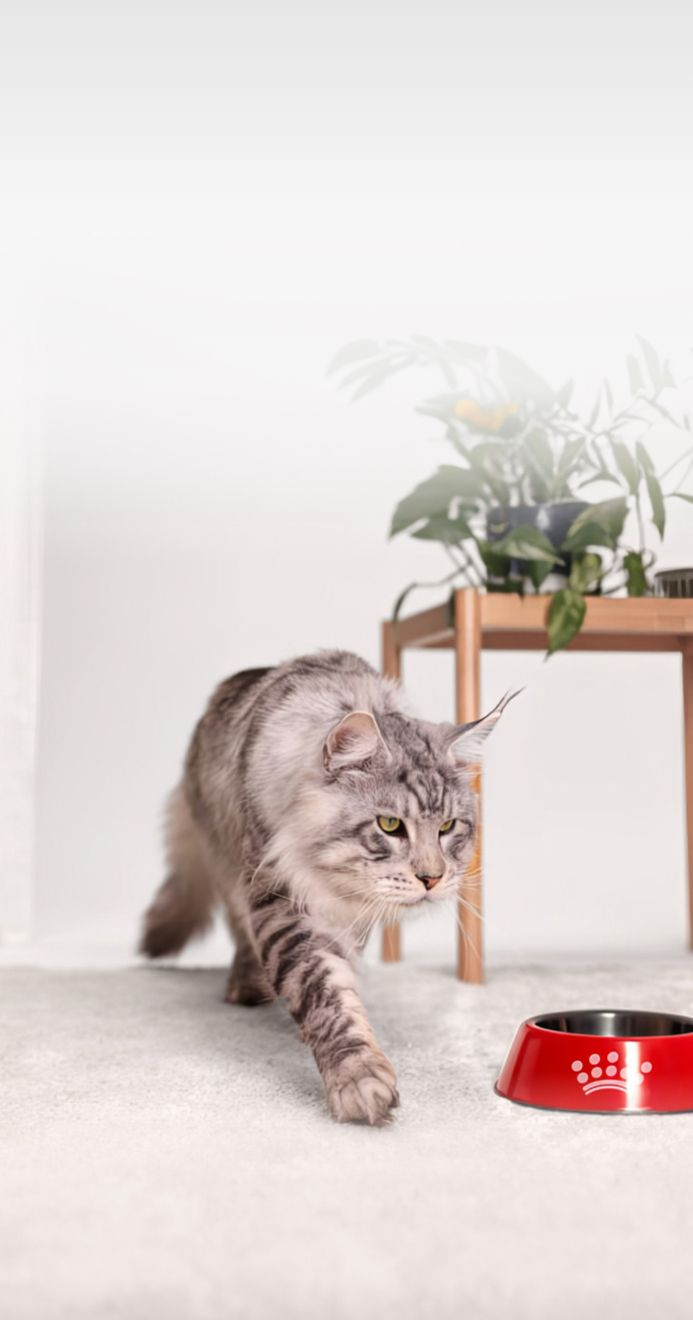
Find the right product for your cat
Answer a few questions about your cat
Get their tailored food recommendation
Support your cat's health with the right diet
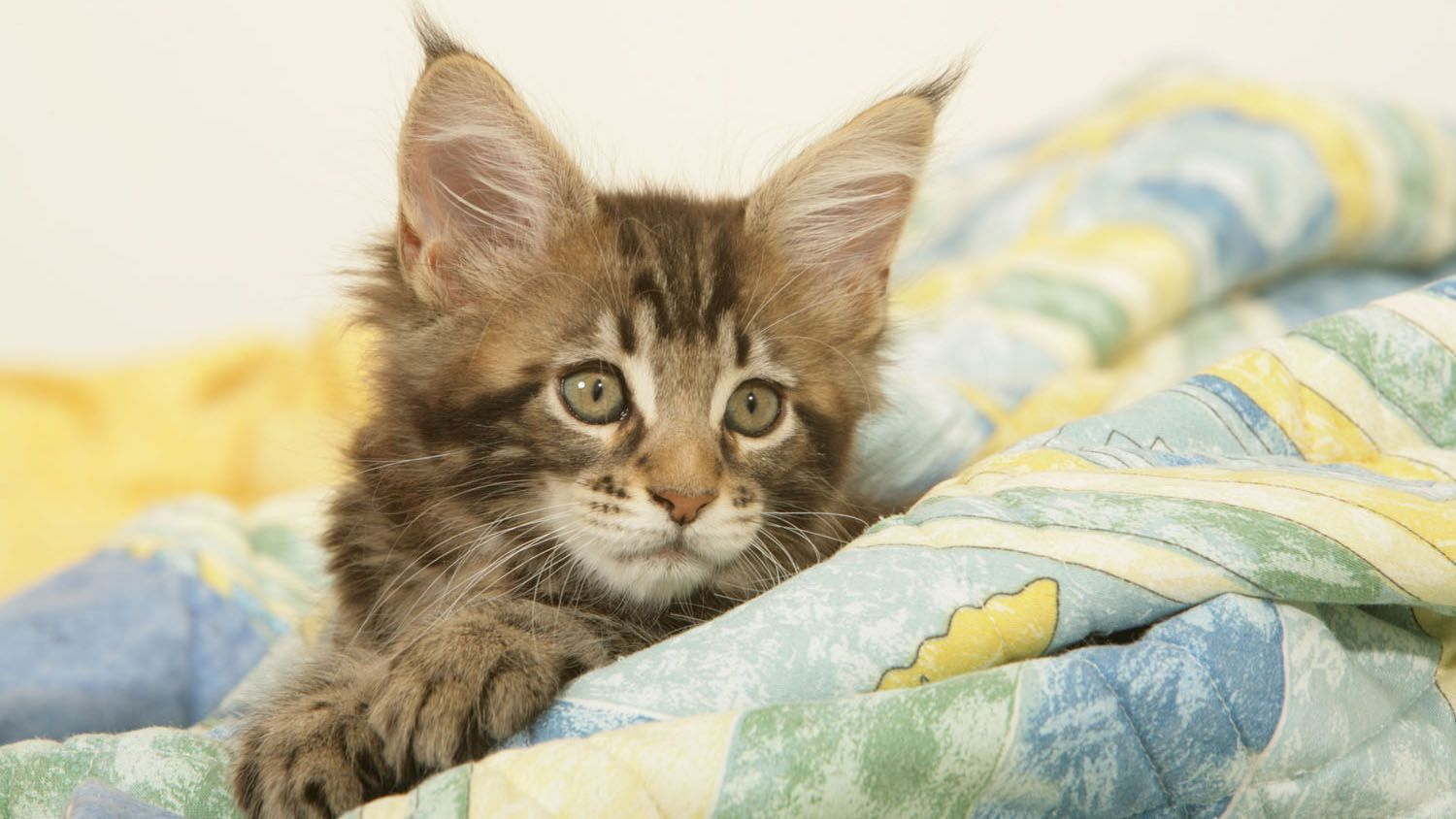
Get to know the Maine Coon
All you need to know about the breed
While some felines can definitely be less than social, Maine Coons are highly people-oriented cats. Friendly, even. While not overly dependent – they won’t constantly pester you for attention – they still prefer to be where you are. And will change rooms when you do. Each and every time.
Not as vertically-oriented as some other breeds, a Maine Coon prefers to check out objects on the ground as opposed to climbing. And they develop slowly: Maine Coons don’t achieve full size until they are three to five years old. But their dispositions remain kittenish throughout their lives -- they stay playful and curious, investigating whatever activity their owners are involved in.
Maine Coons rarely meow. Instead, most have what can be characterised as a soft chirp or trill in a small, quiet voice which doesn't seem to fit their grand stature. Lion-maned around the neck, Maine Coons’ coats can be described as “all weather” as they are water-resistant. A fine soft undercoat is covered by a medium-length, flowing outer layer which, although silky, has a distinct bulk. It keeps the cat warm in cold weather, as does their bushy tail, which they wrap around them for extra insulation. Maine Coon cats can have a regal, at times feral, regard, but don’t let that fool you – they are generally very sweet-natured and loyal to their owners right back.
The Maine Coon is, unsurprisingly, not a great sportsman due to their size. But their peaceful character and patience make them excellent companions for children, as well as for the rest of the family. Easy to live with and quite sociable, fully grown Maine Coons generally get along well with dogs as well as other cats. All in all, a pretty ideal housemate!
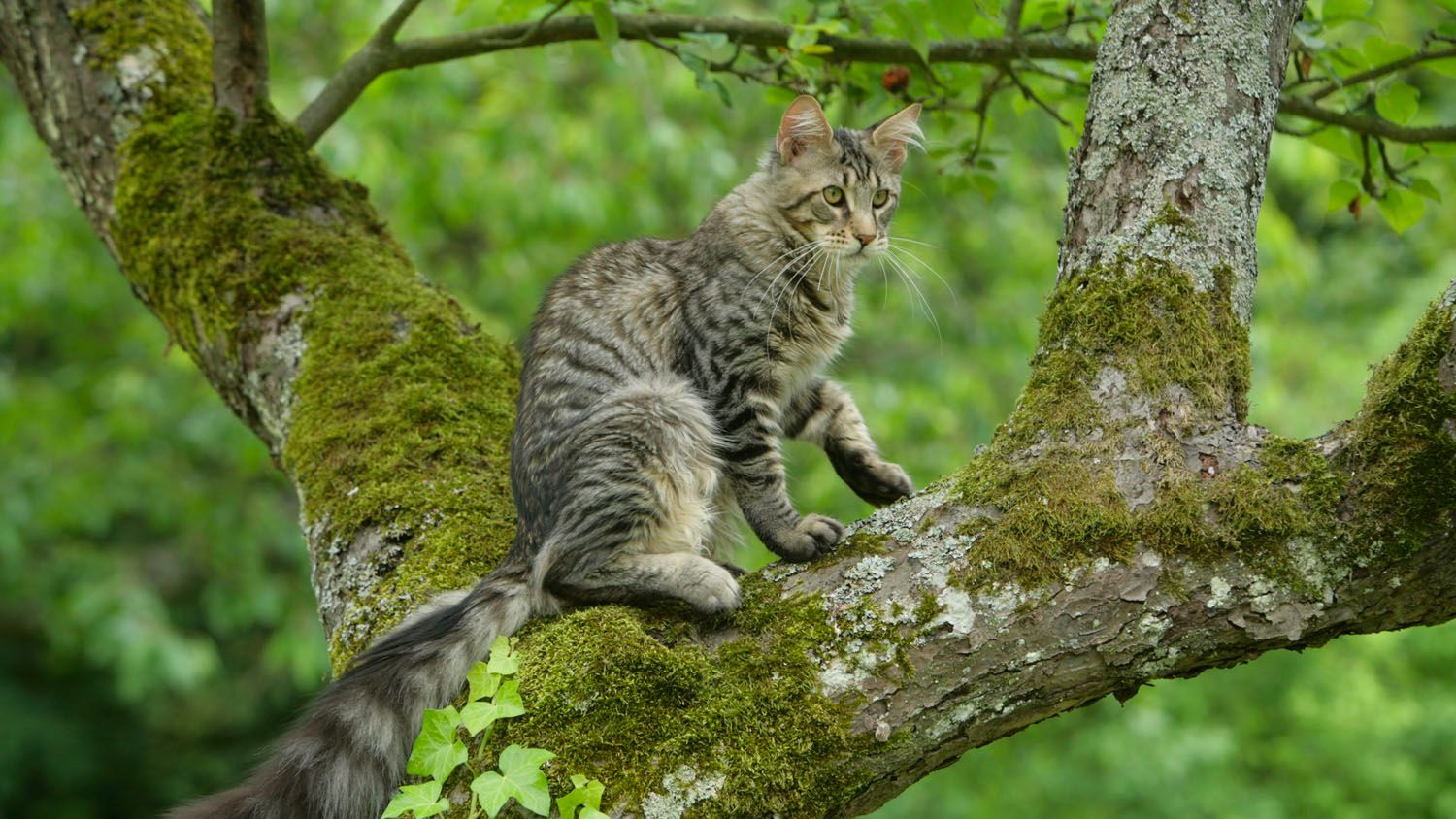
2 facts about Maine Coons
1. The fluff factor
This is not a petite cat by any means. But with such a fluffy, lush coat, some Maine Coon cats may appear bigger than they would if their coats were shorter. Either way, underneath is a rugged muscularity and a long, strong body.
2. Oops, did I do that again?
While the Maine Coon is quite dexterous, they can be a bit clumsy and miscalculate heights when jumping onto surfaces. It is perhaps more noticeable because of their size, but it just adds to their playful appeal.
History of the breed
While generally regarded as native to the state of Maine, how the Maine Coon got there is not precisely documented.It is the subject of much back and forth. A widespread though biologically impossible myth is that the breed originated from mating semi-wild domestic cats with racoons.
This belief, and the cat’s appearance, led to the adoption of the name Maine Coon. Another popular theory has the breed descending from the six pet cats Marie Antoinette sent ahead to Wiscasset, Maine when planning to escape France during the French Revolution. Vraiment!
Most breeders today believe the Maine Coon breed originated in matings between short-haired domestic cats and overseas longhairs. And that natural selection due to environmental conditions produced these large, muscular and dense-coated cats able to survive harsh winters in New England.
One of the oldest breeds in North America, Maine Coons were popular competitors at early cat shows in Boston and New York. A brown tabby female named “Cosie” won “Best Cat” at the 1895 Madison Square Garden Show. The breed hasn’t looked back since.
From head to tail
Physical characteristics of Maine Coons
1.Coat
2.Bones
3.Head
4.Tail
5.Look
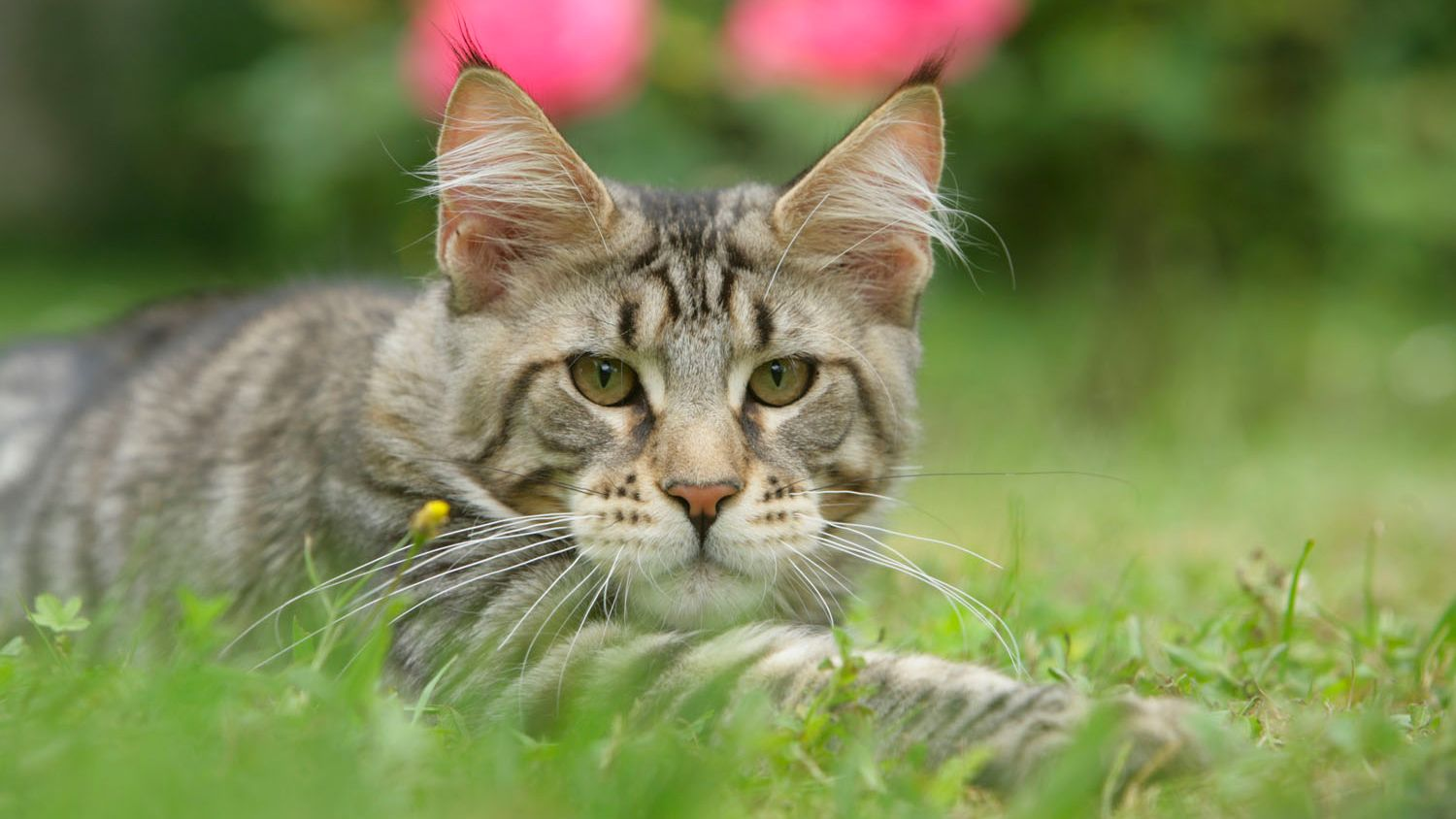
Things to look out for
From specific breed traits to a general health overview, here are some interesting facts about your Maine Coon
As a large cat, the Maine Coon needs exercise to stay healthy.
With their full size, the Maine Coon can have a tendency to hold onto extra weight as they get older. One way to help keep it under control is with regular play. For the Maine Coon, as with any big cat breed, chasing toys, even wadded up paper balls, and grabbing them with their large paws not only helps keep them in good health, it goes a long way towards keeping their ‘mousing’ skills sharp as well. Your vet can advise on playing with your Maine Coon to help your cat stay in great shape.
Feline hypertrophic cardiomyopathy can be an issue.
Generally healthy as a breed, the Maine Coon has certain predispositions to some diseases, the most serious of which is feline hypertrophic cardiomyopathy. A condition that involves thickening of the muscle of the heart, it can be genetic. But can also be related to a diet too low in amino acids like taurine. While the disease can result in significant cardiovascular disease, including heart failure, veterinarians suggest periodic chest X-rays and echocardiography (an ultrasound examination of the heart) for early detection of any issues.
Hip sensitivity runs in the breed
Because of the Maine Coon’s full size and musculature, the breed can be sensitive at the level of the hips, where dysplasia can be triggered. Genetic, one study has shown that up to 51% of Maine Coon cats had radiographic evidence of hip dysplasia. No need to panic! A reputable breeder will be testing for this in prospective parents, not breeding carrier to carrier. And a healthy, well-rationed diet and regular checkups go a long way toward helping keep your cat in optimal good health.
Healthy diet, healthier cat
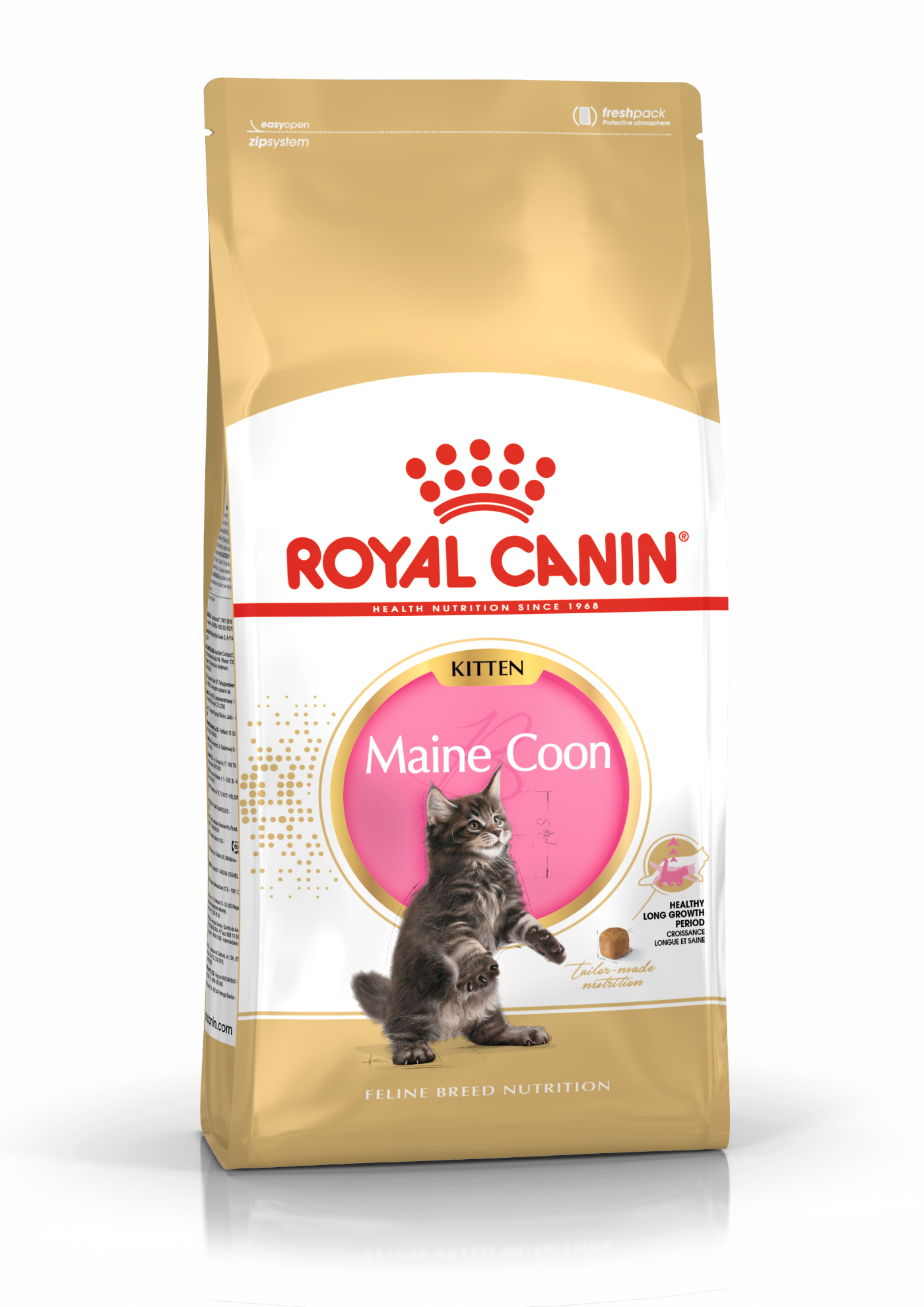
Tailored health nutrition has a fundamental role to play in maintaining the health and beauty of Maine Coon cats. Food provides energy to help with vital functions and a complete nutritional formula for Maine Coons should contain an adapted balance of nutrients. Feeding them in this way will offer a diet that’s neither deficient nor excessive, both of which could have adverse effects on your cat’s health. Clean, fresh water should be available at all times to support good urinary regularity. Cats are also naturally adapted to eating small servings - between 7 and 10 times a day. Giving them the recommended daily ration of kibble once a day will let your Maine Coon regulate their consumption.
The following recommendations are for healthy animals. If your cat has health problems, please consult your veterinarian who will prescribe an exclusively veterinary diet.
Growth for the Maine Coon kitten is exceptionally long, laying down the framework for the breed's unique large stature. At the same time, they become much larger, very quickly, than standard kittens: a 3-month-old Maine Coon kitten can weigh almost 2kg, which is roughly twice as much as kittens of other breeds! The Maine Coon kitten’s growth comes in two phases:
Construction - From Birth to 4 Months
Weaning is the transition a kitten makes from liquid - or maternal milk - to solid food. This period naturally corresponds to the time when they cut their milk teeth, at 3 to 6 weeks old. At this stage kittens are not yet able to crunch, so a soft meal (rehydrated kibble or an adapted wet food) helps facilitate the transition between liquids and solids. Between 4 and 12 weeks after birth, the natural immunity a kitten receives from the mother’s colostrum - or first milk - decreases while the kitten’s immune system gradually develops. This critical time, called the immunity gap, requires a complex of antioxidants, including vitamin E, to help support their natural defences. Kittens go through an intense and particularly delicate period of growth during which they’re prone to digestive upsets. Their diet at this time should not only be rich in energy to meet their essential growth needs but should also contain highly digestible protein to cater to their digestive system that’s still maturing. Prebiotics, such as fructo-oligosaccharides, can also aid their digestive health by helping to support intestinal flora. The result? Good stool quality, all the time. The kitten’s food should contain omega 3 fatty acids - EPA-DHA - which helps support the proper brain development.
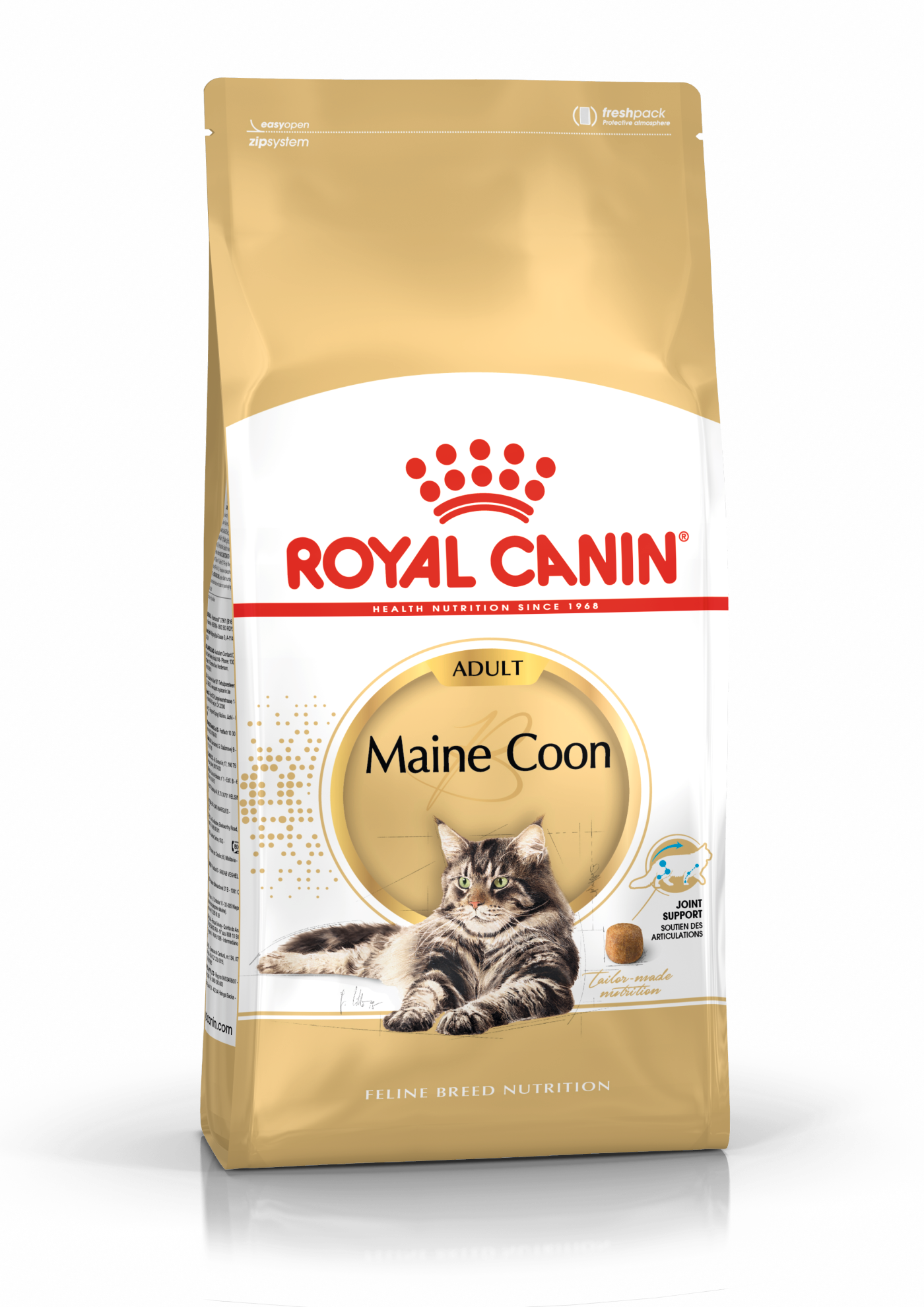
On top of maintaining a healthy urinary function as for all cats, the main nutritional goals for adult Maine Coons are:
Supporting the joints of a powerful skeleton thanks to chondroitin sulfate, glucosamine, and EPA-DHA. Big, heavy and powerful, the Maine Coon demands a great deal of their joints.
Watching out for their heart with adapted levels of magnesium, sodium, potassium, arginine, EPA-DHA, taurine, L-carnitine, and antioxidants. Despite their imposing physique, Maine Coons may be prone to certain problems such as hypertrophic cardiomyopathy, or a hardening of the walls of the heart.
Helping to preserve the health of their skin and the beauty of their magnificent coat, with the enriched addition of targeted nutrients that reinforce the skin’s role as a barrier
Supporting good oral hygiene thanks to a kibble shape adapted to their large square jaw with a texture that induces chewing

A senior cat - one over the age of 12 - may sometimes have difficulties with absorption. To maintain the weight of the ageing cat and minimise the risk of deficiency, they should be given an extremely digestible food filled with essential nutrients.
As they get older, cats increasingly suffer from teeth problems, and in some senior cats, the sense of taste and smell may decline as well, which can lead to a lowered intake of food. To ensure they continue to eat enough, the shape, size, and hardness - meaning texture - of their kibble needs to be tailored to their now potentially more fragile jaw.
Note that the best energy level for any cat still depends on their lifestyle, even those who are ageing. A senior cat that continues to go out regularly will benefit from a diet with a slightly higher fat content. On the other hand, ageing does not reduce an indoor cat’s risk of obesity. Their calorie intake should still be closely monitored. A food with a moderate fat content then may be optimal.
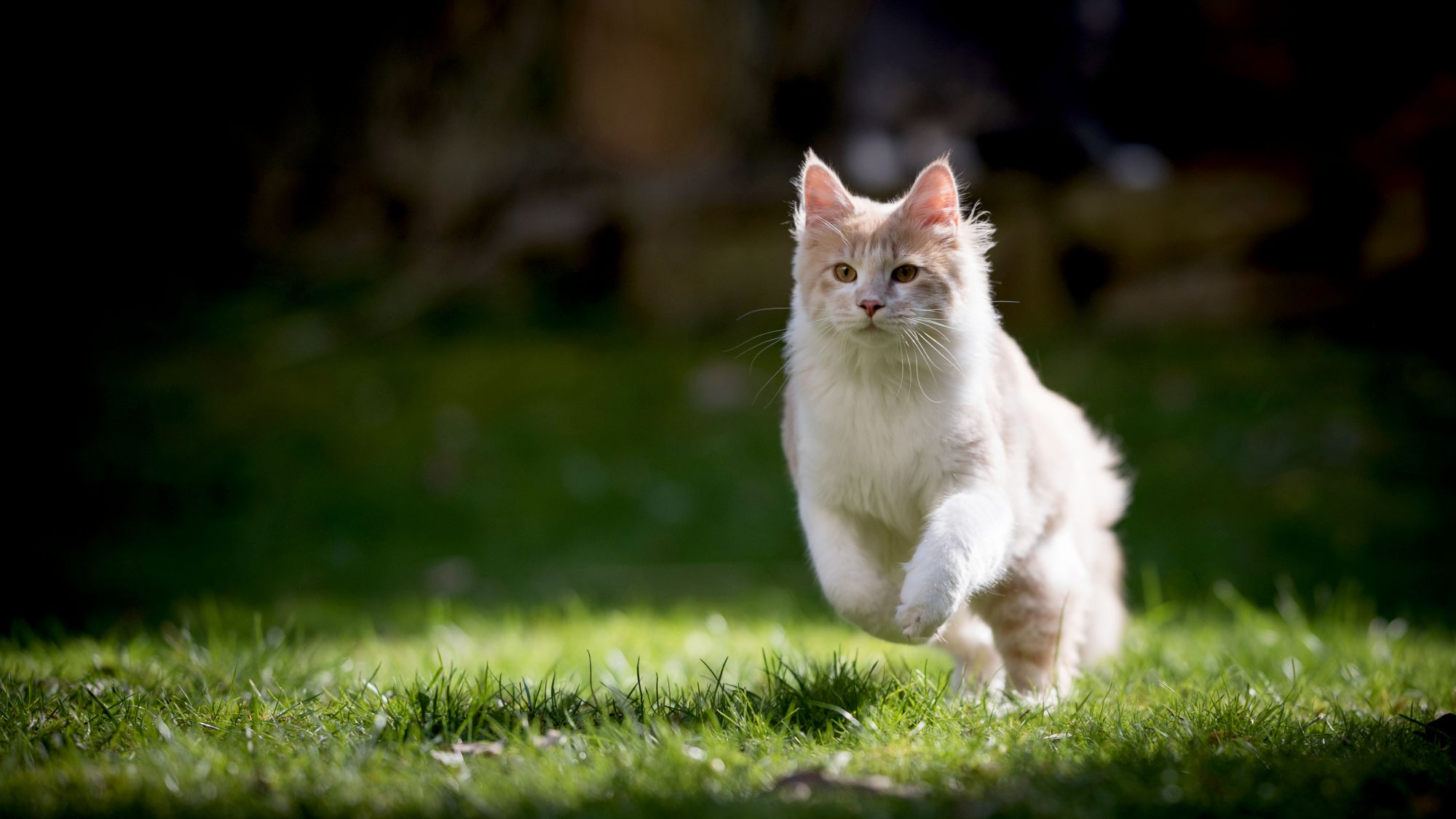
Caring for your Maine Coon
Grooming, training and exercise tips
Making sure your Maine Coon stays active is important for ensuring they live longer, healthier lives. Tapping into their naturally curious personalities, you can stimulate them mentally while engaging them physically with interactive toys and other creative tricks. Strings, battery-operated mice, even toys with catnip in them will get your Maine Coon running and jumping around. Even twenty minutes a day goes a long way to keeping your big cat fit. Optimal: 20-60 minutes a day split into 10-minute segments. Cats shouldn’t exercise for too long in one go. Either way, it is anybody’s guess who will enjoy the playtime more.
Despite their medium to long hair, the Maine Coon's grooming needs are surprisingly minimal. The coat is not inclined to get matted as easily as other longhaired breeds (like the Persian). Use a metal comb once a week to groom your cat’s coat and keep it tangle-free. Your cat will enjoy the attention and it’s another great reason to get some one-on-one time.
Cats in general, and Maine Coons in particular, are very open to training and can be clicker-trained to do many things. And modern feline training methods are very well-suited to the Maine Coon’s personality. Positive reinforcement - rewarding what they do right - appeals to their affinity for interaction with their owners. Think repetition, and short sessions. Both are perfect for your pet’s natural curiosity, attention span and intelligence.
Making sure your Maine Coon stays active is important for ensuring they live longer, healthier lives. Tapping into their naturally curious personalities, you can stimulate them mentally while engaging them physically with interactive toys and other creative tricks. Strings, battery-operated mice, even toys with catnip in them will get your Maine Coon running and jumping around. Even twenty minutes a day goes a long way to keeping your big cat fit. Optimal: 20-60 minutes a day split into 10-minute segments. Cats shouldn’t exercise for too long in one go. Either way, it is anybody’s guess who will enjoy the playtime more.
Despite their medium to long hair, the Maine Coon's grooming needs are surprisingly minimal. The coat is not inclined to get matted as easily as other longhaired breeds (like the Persian). Use a metal comb once a week to groom your cat’s coat and keep it tangle-free. Your cat will enjoy the attention and it’s another great reason to get some one-on-one time.
Cats in general, and Maine Coons in particular, are very open to training and can be clicker-trained to do many things. And modern feline training methods are very well-suited to the Maine Coon’s personality. Positive reinforcement - rewarding what they do right - appeals to their affinity for interaction with their owners. Think repetition, and short sessions. Both are perfect for your pet’s natural curiosity, attention span and intelligence.
7/7
All about Maine Coons
You notice the prominently visible “M” on the forehead of your cat (when they have tabby markings) and the bunch of fluffy hair in it, and you start thinking it’s a Maine Coon cat. Look into cat DNA testing which can help you discover more about your cat’s origins, Maine Coon or otherwise.
Maine Coons are communicative, expressing themselves through their voices and body language. Sometimes, they can chirp to you non-stop while following you around, making them a naturally expressive cat breed. You may notice them making that Maine Coon vocal sound – not a meow, perhaps a little purr, totally breed-specific and, at the same time, hard to describe! A combination like this produces a harmonious trill, one of the Maine Coon traits for communicating with humans and other cats alike.
Tailored nutrition for your Maine Coon
Other breeds that might interest you
Read more on this topic
Sources
- Veterinary Centers of America https://vcahospitals.com/
- Royal Canin Cat Encyclopaedia. Ed 2010 and 2020
- Banfield Pet Hospital https://www.banfield.com/
- Royal Canin BHN Product Book
Like & share this page